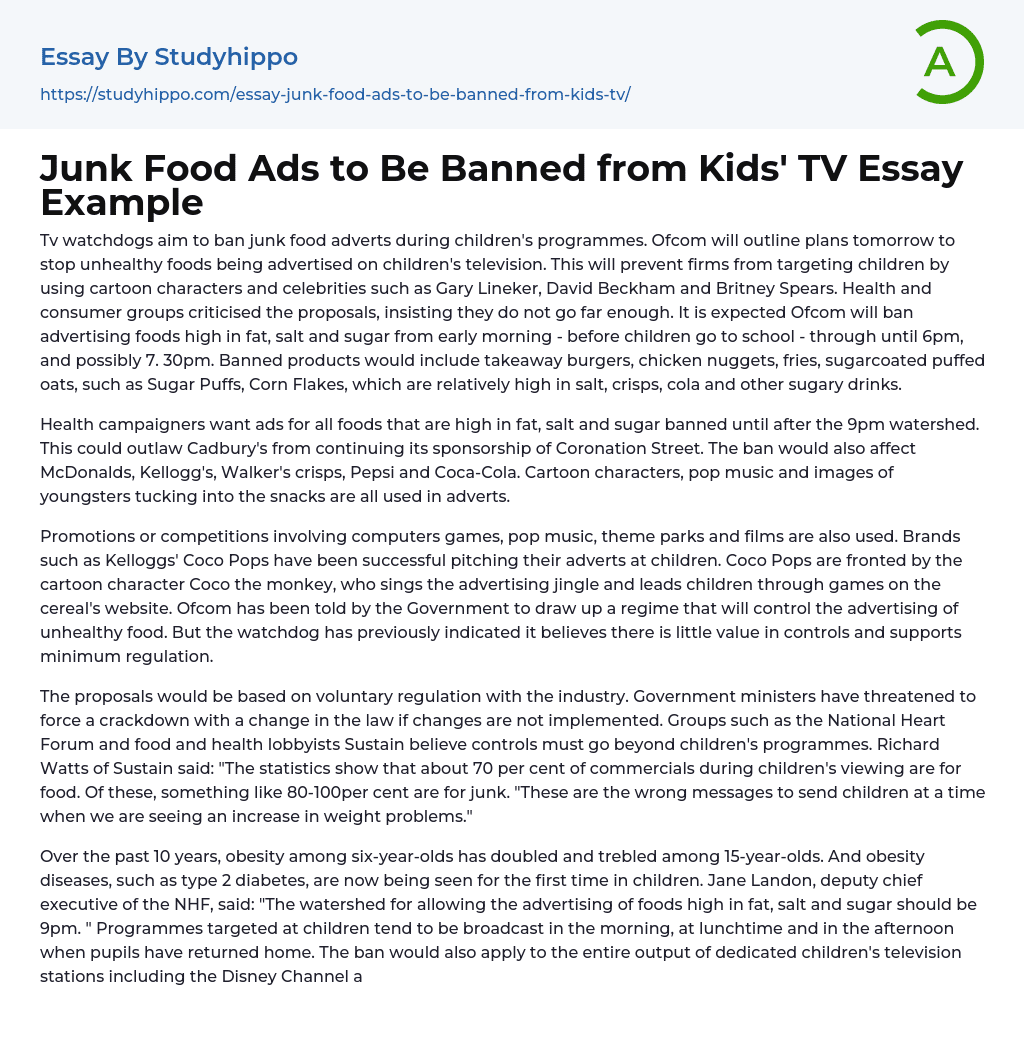Ofcom is planning to prohibit the promotion of unhealthy food during children's programs as a way to prevent companies from targeting children using popular characters and celebrities like Gary Lineker, David Beckham, and Britney Spears. However, health and consumer groups believe that the proposed measures are inadequate. Ofcom is expected to implement a ban on advertising foods with high levels of fat, salt, and sugar from early morning until 6 or possibly 7:30 PM - before children go to school. The prohibited products would include takeaway burgers, chicken nuggets, fries, sugarcoated puffed oats (such as Sugar Puffs), Corn Flakes (which have relatively high salt content), crisps, cola, and other sugary drinks.
Advocates for health are calling for a ban on advertisements that promote foods high in fat, salt, and sugar before 9 pm. This ban would impact Cadbury's sponsorship of Coronation St
...reet as well as the advertising campaigns of McDonald's, Kellogg's, Walker's crisps, Pepsi, and Coca-Cola. These ads often use cartoon characters, popular music, and images showing children enjoying these snacks.
The advertising of computer games, pop music, theme parks, and films is also utilized for promotions or competitions. One successful example is Kelloggs' Coco Pops, which targets children through their advertisements. Coco Pops features the cartoon character Coco the monkey, who sings the advertising jingle and engages children with games on the cereal's website. The Government has instructed Ofcom to develop regulations for controlling the promotion of unhealthy food. However, Ofcom has previously expressed its belief that minimal regulation is effective and sees limited value in imposing controls.
The government is suggesting that the industry should voluntarily regulate itself
but they have warned that if the industry does not comply, changes will be enforced through new legislation. The National Heart Forum, Sustain, and other food and health lobbyists argue against limiting controls to only children's programs. Richard Watts of Sustain highlights alarming statistics indicating that 70% of commercials during children's viewing promote food, with approximately 80-100% of these advertisements being for unhealthy junk food. Watts emphasizes that sending such messages to children is particularly worrisome given the growing problem of weight-related issues.
In the past decade, there has been a significant surge in childhood obesity rates. The number of obese six-year-olds has doubled, while obese 15-year-olds have tripled in number. This increase in obesity among children has also resulted in a rise in diseases associated with it, such as type 2 diabetes. To tackle this problem, Jane Landon, NHF's deputy chief executive, suggests implementing a restriction on advertisements promoting unhealthy foods before 9pm. As children-focused programs are typically broadcasted during specific times like morning, lunchtime, and afternoon when kids return from school, this ban would be applicable to both regular TV channels and dedicated children-specific channels like Disney Channel and Nickelodeon.
Ofcom has cautioned that implementing a 9pm watershed could be highly problematic, as it could significantly impact the revenue of certain commercial TV channels. An alternative approach would involve prohibiting all types of food advertisements, including those promoting healthy products, prior to the watershed. This would prevent the specific targeting of junk food manufacturers for a ban. Food expert Sue Dibb from the National Consumer Council expressed her disappointment, stating that anything short of comprehensive restrictions on all TV ads and
promotions for high fat, salt and sugar foods before 9pm would be highly unsatisfactory. The British Medical Association and backbench Labour MPs are also in favor of a complete prohibition on junk food commercials.
Dr Vivienne Nathanson, head of science and ethics at the BMA, has called for an end to the marketing of unhealthy cereals, snacks, and processed meals targeting children and parents. The Food & Drink Federation disagrees with the need for restrictions, arguing that demonizing specific products oversimplifies the complex nature of people's lifestyles and eating habits. In a similar vein, Peter Beresford, the UK boss of McDonalds, rejects TV advertising restrictions and asserts that McDonald's should not be held responsible for the increase in obesity. According to Beresford, there is no distinction between good and bad food, only poor dietary choices.
- Food Safety essays
- Food Security essays
- Beverages essays
- Cuisines essays
- Dairy essays
- Desserts essays
- Fast Food essays
- Bread essays
- Meal essays
- Meat essays
- Organic Food essays
- Rice essays
- Sugar essays
- Taste essays
- Beef essays
- Coconut essays
- Crowd essays
- Dinner essays
- Juice essays
- Sainsbury essays
- Cooking essays
- Ginger essays
- Oreo essays
- Drink essays
- Beer essays
- Wine essays
- Coffee essays
- Tea essays
- Cake essays
- Hamburger essays
- Ice Cream essays
- Burger essays
- Pizza essays
- Fruit essays
- Lemon essays
- Food Waste essays
- Favorite Food essays
- Alcoholic essays
- Soft Drinks essays
- Cookie essays
- Starch essays
- Yeast essays
- Cola essays
- Pizza Hut essays
- snack foods essays
- chips essays
- Biscuit essays
- Brewing essays
- Brewery essays
- Causes Of Obesity essays




